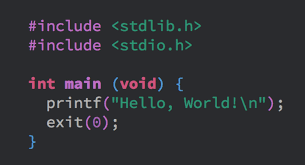C programming language, developed in the early 1970s by Dennis Ritchie at Bell Labs, is often regarded as the "mother" of modern programming languages. Despite being over five decades old, C remains widely used due to its simplicity, efficiency, and versatility. Here's an introduction to C programming and why it is still relevant today.
What is C Programming?
C is a general-purpose, procedural programming language designed for system-level and application-level programming. Its straightforward syntax and close-to-hardware capabilities make it an ideal choice for tasks like operating system development, embedded systems, and performance-critical applications.
Key Features of C
Simplicity and Efficiency
C offers a straightforward syntax, making it relatively easy to learn for beginners. It is also highly efficient, producing fast and optimized machine-level code.
Low-Level Access
Unlike high-level languages, C allows direct manipulation of memory through pointers, which is essential for system-level programming.
Portability
Programs written in C can be compiled and executed on various machines with minimal changes, making it highly portable.
Rich Library Support
C provides a standard library with numerous built-in functions for string handling, file I/O, math operations, and more.
Foundation for Modern Languages
Many popular programming languages, such as C++, Java, and Python, are either based on or inspired by C. Learning C helps in understanding the core concepts of these languages.
Why Learn C in 2024?
Foundational Knowledge
C teaches you fundamental programming concepts like data structures, memory management, and algorithms.
Versatility
It is widely used in developing operating systems (like Linux), embedded systems, and game engines.
Career Opportunities
Professionals skilled in C are in demand for roles involving systems programming, firmware development, and performance optimization.
Sample Code: Hello World in C
#include <stdio.h>
int main() {
printf("Hello, World!\n");
return 0;
}
This simple program demonstrates how to print "Hello, World!" using C. The #include <stdio.h> directive imports the standard input-output library, and printf() is used to display text.
Getting Started with C
Install a Compiler
Popular options include GCC (GNU Compiler Collection) and Clang. IDEs like Code::Blocks or Visual Studio also provide integrated compilers.
Practice Fundamentals
Start with basic concepts like variables, loops, and functions before diving into advanced topics like pointers and file handling.
Build Projects
Apply your knowledge by working on small projects like calculators, file parsers, or simple games.
Conclusion
C programming is an evergreen skill that forms the backbone of many technological advancements. Whether you're a beginner exploring programming or an experienced developer seeking to deepen your understanding, C is a valuable language to learn. Its rich history, vast applications, and influence on modern computing ensure its relevance for years to come.
Do you have any experience with C programming? Share your thoughts or favorite C projects in the comments below!
